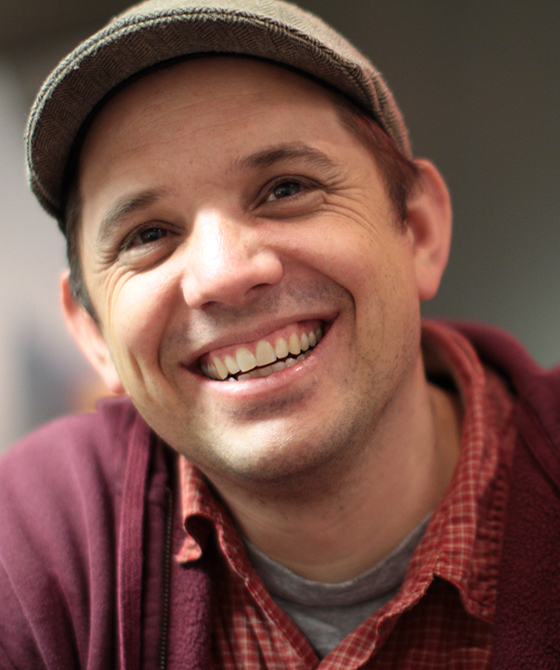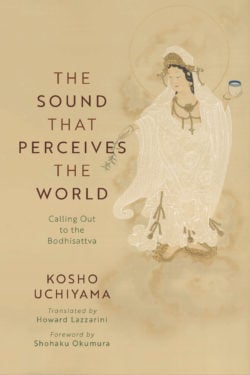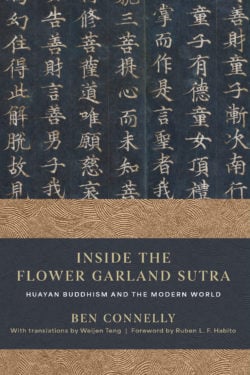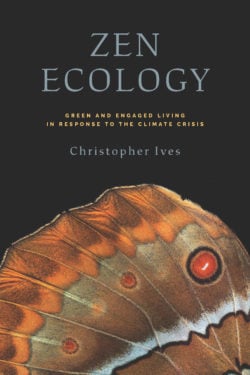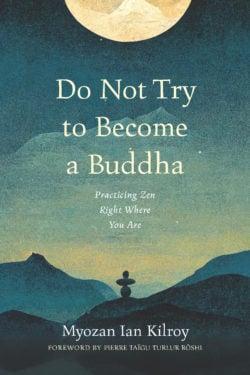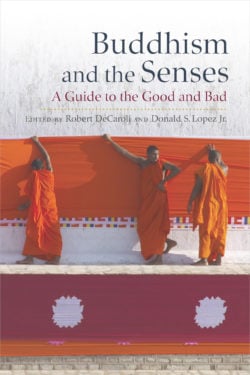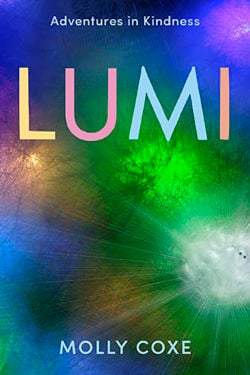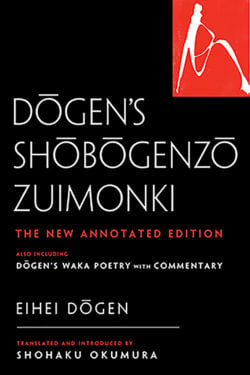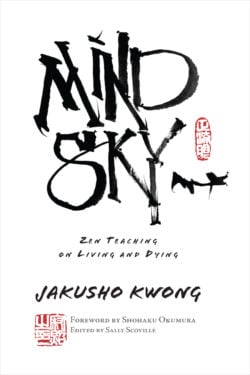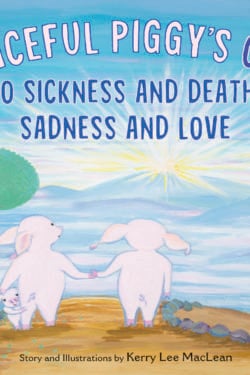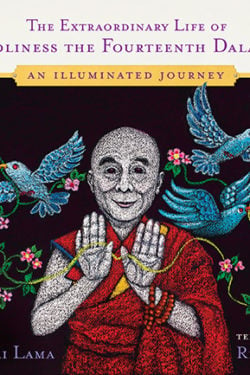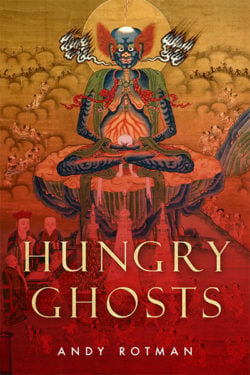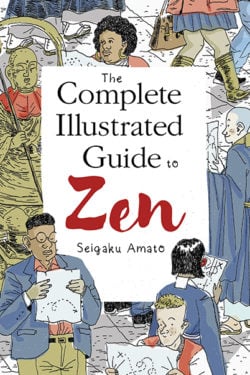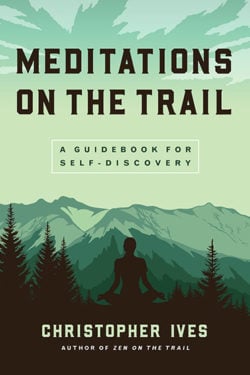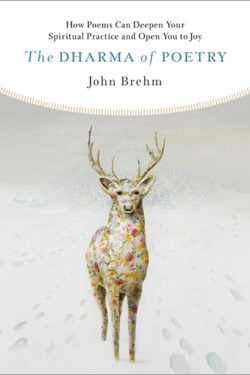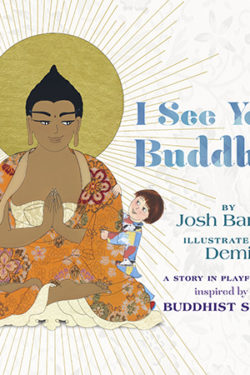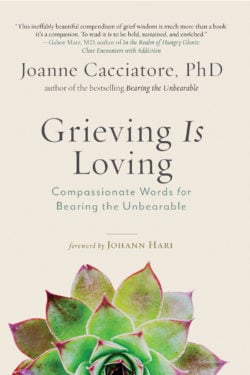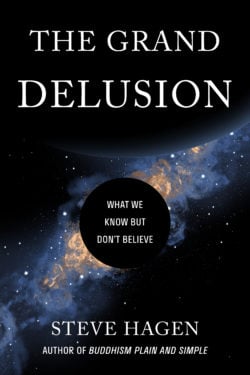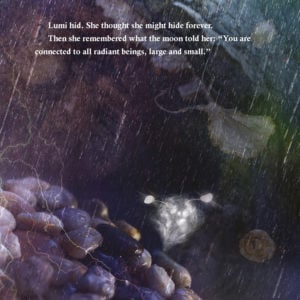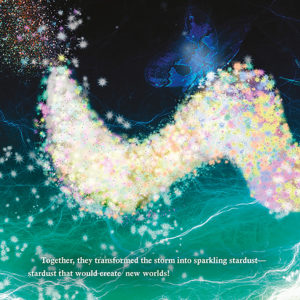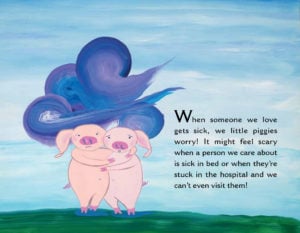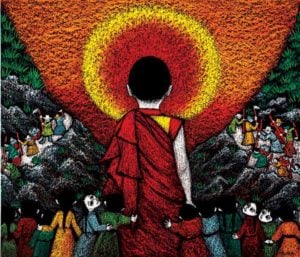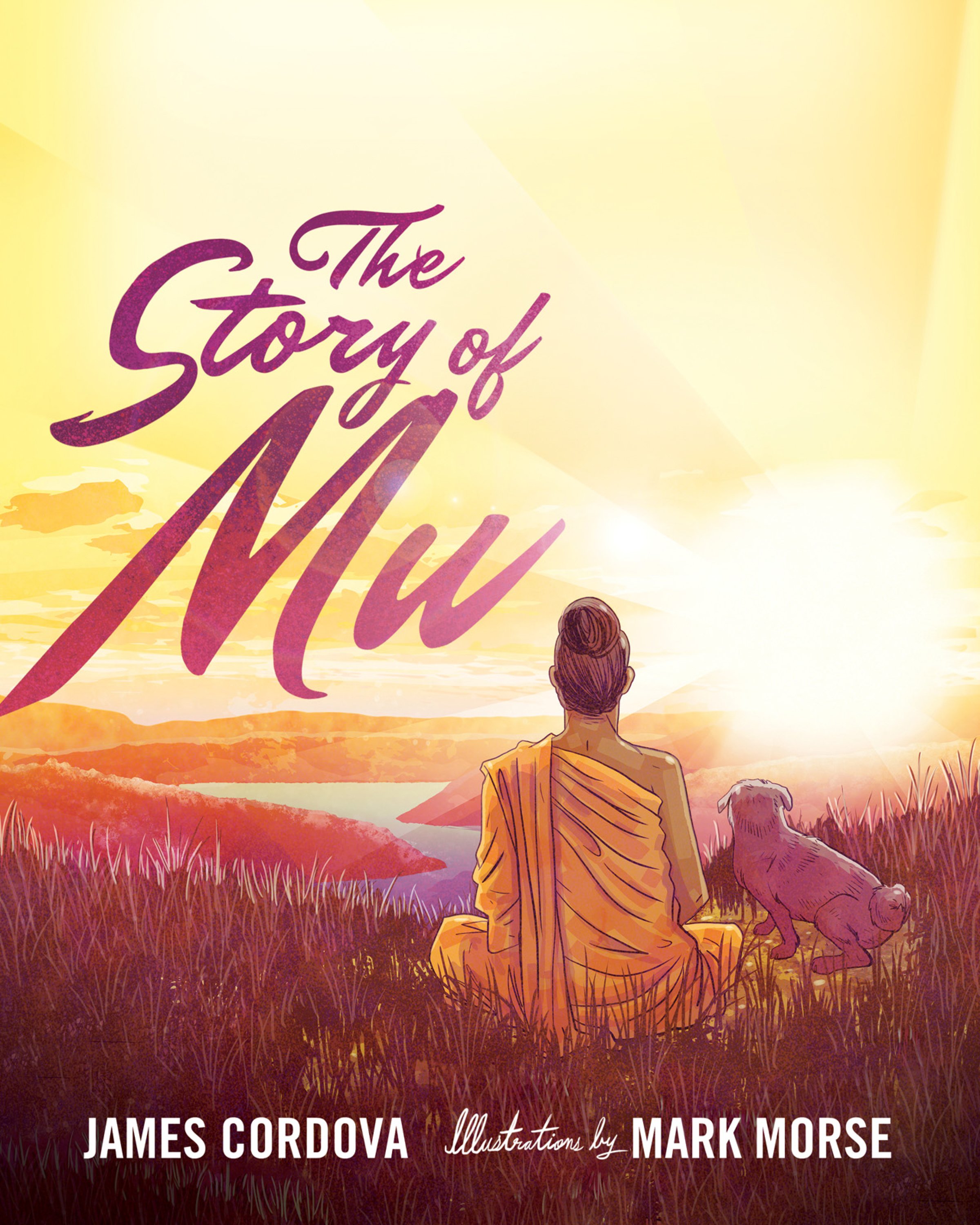
THE STORY OF MU
In the beginning, before the beginning, there was Mu.
And Mu was Mu and that was that and it was good.
This lush, beautifully illustrated narrative breathes humanity and warmth into one of the most famous and enigmatic koans of the Zen tradition.
The Story of Mu uses luminous illustrations and a mythic narrative structure to convey the great potential for peace and enlightenment that we all carry hidden within ourselves. Shot through with ineffable “thisness and thusness,” Mu spins a visually rich, cosmogonic fable about the origins of the universe of space, time, matter, and life. It also touches something lost but always present within the human heart: an awakeness that is without flaw, from the beginning before the beginning.
Includes a complementary essay from Zen teacher James Ishmael Ford.
- Paperback
- 64 pages, 8.00 x 10.00 inches
- $19.95
- ISBN 9781614292203
- eBook
- 64 pages
- $11.99
- ISBN 9781614292388
“Morse’s illustrations, often in warm tones, convey both the magnificence of the cosmos and the quiet grace of daily life...an accessible rendition of a vital Buddhist concept.”—Publishers Weekly
Discover More
The Sound that Perceives the World
Musings and autobiographically informed commentary on the human condition through the lens of the Kannon-gyo—chapter 25 of the Lotus Sutra—connecting Zen and Pure Land Buddhism through the practice of venerating and chanting the names of buddhas and bodhisattvas.
The Kannon-gyo is chapter 25 of the Lotus Sutra, and its focus is the bodhisattva of compassion, Avalokiteshvara, known in China as Guanyin, and in Japan as Kannon or Kanzeon. The text describes the many ways in which calling out the bodhisattva’s name—Namu Kanzeon Bosatsu—can relieve suffering.
Most schools of Zen Buddhism, and especially the Soto school, eschew such practices as chanting the names of buddhas and bodhisattvas, along with venerating such figures.
The eminent Soto Zen master Kosho Uchiyama Roshi, however, while doing hard physical labor early in his career, could not practice zazen—that is, formal sitting meditation. He came to appreciate the Kannon-gyo and the practices related to it. In particular, he took to reciting Kannon’s name, as recommended in the text of the Kannon-gyo.
Later in life, Uchiyama Roshi suffered from illness that again prevented him from practicing formal Zen, so he returned to the Kannon-gyo and the practice of chanting. He went so far as to assert that chanting Kannon’s name is completely equivalent to zazen, that the two practices are simply two sides of the same coin—a revolutionary idea seemingly at odds with Zen.
Chanting practice is especially accessible, as it can be done while working, traveling, or suffering from illness, and other activities that would ordinarily get in the way of formal Zen practice.
With these practices, the Kannon-gyo, and Kannon herself as a backdrop, Uchiyama Roshi muses about the purposes of religion, the goals of religious practice, and the meaning of enlightenment—and their relation to suffering itself.
Inside the Flower Garland Sutra
A Soto Zen teacher explores the core teachings of the ancient Flower Garland school of Buddhism through an innovative and engaging narrative showing how to put these teachings into practice.
Huayan Buddhism arose in the sixth century in China rooted in the Mahayana Flower Garland Sutra. The teachings of Huayan and the sutra that inspired it had a profound influence on Chan and Zen. Huayan is relational, practical, and positive. Its emphasis on interdependence, celebration of the sensual world, and diversity of people and practices provides inspiration for what Thich Nhat Hanh called “engaged Buddhism”.
With Inside the Flower Garland Sutra Zen teacher Ben Connelly explains the significance of Huayan teachings for Buddhist practice. Each chapter is a commentary on one of the thirty lines of Uisang’s “Song of Dharma Nature”—a seminal Korean text that summarizes key aspects of Huayan thought—thus providing a broad overview of Huayan teachings and their practical implications for contemporary life, with a mix of testimonies from real-life situations and references to influential Buddhist texts.
Arising fifteen hundred years ago, Huayan has made a deep impact on East Asian Buddhism, and has much to offer during this era when many folks see ever-deepening divisions. Connelly explores how Huayan offers particular wisdom for those concerned about how to care for their own lives as they work to end harms such as ecological devastation, poverty, militarism, addiction, marginalization, and exploitation.
Zen Ecology
Discover a way of living that can help you slow down and stay grounded—and at the same time reduce your ecological impact and engage more fully with the climate crisis.
It may seem as though living ecologically and engaging in activism sacrifices our own enjoyment and happiness on the altar of doing the right thing. In this book, professor, naturalist, and Buddhist author Christopher Ives offers an alternative: a way of living that can actually be more fulfilling than the modern consumerist lifestyle. Rather than deprivation, it can bring us richness.
In Zen Ecology, Chris outlines his environmental ethic as a series of concentric circles, beginning with ourselves and then moving outward into our communities, all the while focusing on spaciousness, mindfulness, generosity, and contentment. At the individual level, we deal with distraction, clutter, and ecological harm. Here, Chris offers ways to help us pay attention, simplify our lives, and lower our impact. Then, we explore how to envision our home as a “place of the Way,” with Zen monastic life as a model for this—without having to be a monk! Next, we realize our embeddedness in nature and emplace ourselves in community with others, including other forms of life. Finally, we build on this basis to engage in activism to create a world that is more supportive of ecological health and spiritual fulfillment.
In this way, we avoid the two extremes of apathy and burnout, and uncover a way of living that is simple, joyful, embedded in nature, connected to others in community, and supportive of collective action.
You may also be interested in Chris’s other books, Zen on the Trail, which explores the broad question of how to be outside in a meditative way, and Meditations on the Trail, which offers do-anywhere meditations that will help you deepen your connection to nature and yourself.
Do Not Try to Become a Buddha
A Zen Buddhist priest paints a picture of Zen in Ireland in this collection of short essays.
In this collection of short essays, Irish Soto Zen priest Myozan Ian Kilroy describes how he came to practice Zen, introduces some basics of Zen philosophy, and recalls the challenges of establishing a Zen Buddhist community in Catholic-dominated Ireland. Along the way, he explores the rituals and practices that Zen brings to everyday life, from holidays to weddings to birth ceremonies to funerals. A former journalist, Rev. Myozan’s clear yet entertaining storytelling style paints a clear picture of how Zen has adapted to the culture and traditions of Ireland.
Buddhism and The Senses
Across Buddhist traditions, the five senses—sight, sound, smell, taste, and touch—are perceived both positively and negatively. Share eminent scholars’ fascination and deep insight into what makes a sensuous experience good or bad.
Following the exhibition Encountering the Buddha: Art and Practice across Asia at the National Museum of Asian art, ten eminent scholars present their insights into Buddhism’s fascinating relation with the five senses (sight, sound, smell, taste, and touch), which careens between delight and disgust, rarely finding a middle way. While much of Buddhist literature is devoted to overcoming the attachment that dooms us to rebirth in samsara, primarily by deprecating sense experience and showing that whatever brings us sensual pleasure leads only to all manner of physical and mental pain, in texts such as the Lotus Sutra, sensory powers do not offer sensory pleasure but rather knowledge, clear observation, and ability to preach the Dharma. Considering such religiously and historically contingent ambiguity, this volume presents each of the five senses in two instantiations, the good and the bad, opening up the discourse on the senses across Buddhist traditions.
Just as the museum departed from tradition to incorporate sensory experiences into the exhibition, this volume is a new direction in scholarship to humanize Buddhist studies by foregrounding sensory experience and practice, inviting the reader to think about the senses in a focused manner and shifting our understanding of Buddhism from the conceptual to the material or practical, from the idealized to the human, from the abstract to the grounded, from the mind to the body.
Includes essays by Bryan J. Cuevas, Debra Diamond, D. Max Moerman, Reiko Ohnuma, James Robson, Melody Rod-ari, Kurtis R. Schaeffer, John Strong, and Lina Verchery.
Lumi
Lumi is a gorgeously illustrated adventure story and a powerful lesson in the magic of helping others.
Meet Lumi, a tiny radiant being on a mission to spread kindness in the universe. Join her on a heroic journey as she searches for ways to help other beings, and finds that sometimes, she needs help, too!
Endlessly imaginative and lushly illustrated, Lumi is a celebration of the good heart in the littlest ones among us. Come along with Lumi as she shares her light with flower fairies, frozen warriors, a star-stealing monster, and a colony of stranded sea squirts—and discovers that we’re all actually radiant, shining brightly together.
Visit Lumiverse to learn more and to hear Lumi’s very own song!
Dogen’s Shōbōgenzō Zuimonki
Discover the teachings of the preeminent Zen Master Dōgen in his own words, written down by his Dharma successor, Koun Ejō. This edition includes both the Shōbōgenzō Zuimonki and translations of and commentary on Dōgen’s luminously evocative waka poetry.
Distinct from Dōgen’s similarly titled magnum opus (simply called the Shōbōgenzō), the Shōbōgenzō Zuimonki can be read as a highly practical manual of Buddhist practice. Consisting of straightforward and accessible teachings and making more limited use of the allusion, wordplay, and metaphor that characterize the essays in the Shōbōgenzō, this work is an essential read for any student of Zen Buddhism. Among the many topics covered, Dōgen especially emphasizes the following points: seeing impermanence, departing from the ego-centered self, being free from greed, giving up self-attachment, following the guidance of a true teacher, and the practice of zazen, specifically shikantaza, or “just sitting.” Additionally, this translation of the Shōbōgenzō Zuimonki has extensive notes, which help to provide you with a new way of approaching the text.
The collection of waka poems included in this volume are a beautiful artistic expression of the Dharma. Rarely seen in this large of a collection or with commentary, this poetry offers unique insight into an important expression of Dōgen’s teachings.
By the spring wind
my words are blown and scattered
people may see them
the song of flowers
These teachings, which have informed teachers and practitioners alike throughout the centuries, will deepen your knowledge, understanding, and experience of the Sōtō Zen tradition.
Mind Sky
“In Zen meditation, anything that comes in your mind will eventually leave, because nothing is permanent. A thought is like a cloud moving across the blue sky. Nothing can disturb that all-encompassing vastness. This is the Dharma.”
In a collection of talks and anecdotes, Jakusho Kwong-roshi, a Dharma successor of Shunryu Suzuki-roshi, presents his approach to Buddhist teaching. Containing photos of Kwong-roshi with his teachers, as well as a selection of his vibrant calligraphy, Mind Sky explores the profound beauty of Zen history and practice, nature, and the philosophy of the ancient Zen master Eihei Dōgen.
With an elegant simplicity, Kwong-roshi shows how Zen is experiential rather than intellectual. And with persistent practice, realization is already yours.
A Peaceful Piggy’s Guide to Sickness and Death, Sadness and Love
When someone we love gets sick, we little piggies worry! It can feel scary when a person we care about is sick or in a hospital. Luckily, there is one good thing we peaceful piggies can do: meditate.
This is a story about love.
Experiencing a loved one’s illness or death is challenging for both children and their grownups. With three distinct sections to choose from—when someone we love is sick, dying, or has died—this guide will help you easily find soothing and practical mindfulness activities focused on what your young one needs in order to guide them through their big emotions and questions. These practices will help calm and empower children—and their grownups—as they discover they can still be with their loved ones through their heart connection, no matter where they are.
Click here for an animated video based on the story.
The Extraordinary Life of His Holiness the Fourteenth Dalai Lama
One of the most revered spiritual figures of our time—His Holiness the Fourteenth Dalai Lama—tells the story of his life in this intimate, timeless, and approachable book. Featuring luminous illustrations from world-renowned artist Rima Fujita and some never-before-shared details, it’s the perfect way to explore the life of the Dalai Lama. This simple yet powerful text combined with stunning artwork will captivate readers of all ages—and will take you on a mystical journey you won’t soon forget.
Also available in Tibetan.
Hungry Ghosts
“In this wonderful gem of a book, Andy Rotman offers us a compelling translation of a set of ten Sanskrit Buddhist stories about ‘hungry ghosts’ (preta) taken from the Avadānaśataka (“One Hundred Stories”), an important early Indian anthology of Buddhist narratives. Rotman has brought them into the limelight and shown how important they are for Buddhists and for all of us. Hungry Ghosts will become a standard work on the subject.”
—John Strong, Charles A. Dana Emeritus Professor of Religious and Asian Studies, Bates College
The realm of hungry ghosts is one of the unfortunate realms of rebirth in the Buddhist cycle of existence, and those reborn there are said to have led lives consumed by greed and spite. In one of the earliest sources about hungry ghosts, translated here, hungry ghosts know the error of their ways, and they sometimes appear among humans, like the ghosts that haunt Ebenezer Scrooge, as augurs of what may await. Artistic depictions of the travails of hungry ghosts are found throughout the Buddhist world, and some of the best examples are reproduced and richly described here. Discover how an understanding of the meanness (matsārya) that afflicts hungry ghosts illuminates the human condition, offering insight and inspiring compassion for readers both in ancient times and today.
“Rotman brings new life to old stories about hungry ghosts, and he provides unique insight into their development and their importance even for modern Buddhism. A must-read for students of Buddhist thought and art.”
—Monika Zin, Saxon Academy of Sciences and Humanities, Leipzig University
The Complete Illustrated Guide to Zen
The Complete Illustrated Guide to Zen offers a comprehensive overview of Soto Zen Buddhism in a delightfully captivating way. Complete with dynamic, detailed illustrations, Soto Zen Priest Seigaku Amato uses a semi-narrative style to take you on a visual tour of Buddhism and, using specifics to illuminate universals, dives deep into the practices and forms of Soto Zen.
Whether you are just taking your first step or have been practicing Zen for years, this creative and profound book will be a constant companion and guide on your journey as it explores topics such as:
- A brief history of Buddhism
- An iconographic overview of various buddhas and bodhisattvas
- An introduction to the various practices of Zen including meditation (zazen), work practice (samu), and meditative eating (oryoki)
- A what’s what of holidays, ceremonies, temple instruments, and religious vestments
- A how-to guide for setting up a home altar
“This is a cute book! But it’s not just cute, it’s also deep and profound, and is one of the best guides to Zen practice I have ever come across. The illustrations are delightful and the written sections are clear and easy to understand. I give it a million zillion stars!”—Brad Warner, author of Hardcore Zen
“I loved this book and smiled the whole way through. But don’t be fooled by its whimsy! There’s a wealth of experience, knowledge, and devotion behind these illustrations. This book is a perfect guide for a beginning Zen student and makes a delicious snack for the more advanced practitioner.”—Gesshin Greenwood, author of Bow First, Ask Questions Later
Meditations on the Trail
Meditations on the Trail offers a rich array of do-anywhere meditations that will help you explore and deepen your connection to nature, and yourself, in new ways, making the most of your time on the trail.
This small book—perfect for throwing in a daypack or a back pocket as you head out for the trail—is filled with practices to take you into the heart of the natural world and uncover your most vibrant self. You’ll return home grateful, more aware of interconnection, and maybe just a little wiser.
You may also be interested in Chris’s other books, Zen on the Trail, which explores the broad question of how to be outside in a meditative way, and Zen Ecology, in which he reveals a way of living that can help you slow down, stay grounded, and deal with all that is flying at you—and at the same time can help you reduce your ecological impact and engage more effectively with the climate crisis.
Thank You, Percival
What happens if you don’t take the time to train your new puppy?
Things can go very badly!
What happens if you don’t take the time to train your own mind?
Things can go even worse!
This is the story of Percival the puppy and his housetraining. Learn alongside Percival how to juggle your emotions and distractions and find inner peace.
The Dharma of Poetry
In The Dharma of Poetry, John Brehm shows how poems can open up new ways of thinking, feeling, and being in the world. Brehm demonstrates the practice of mindfully entering a poem, with an alertness, curiosity, and open-hearted responsiveness very much like the attention we cultivate in meditation. Complete with poetry-related meditations and writing prompts, this collection of lively, elegantly written essays can be read as a standalone book or as a companion to the author’s acclaimed anthology The Poetry of Impermanence, Mindfulness, and Joy.
Listen to a Wisdom Dharma Chat with John and host Daniel Aitken recorded in October 2023.
I See You, Buddha
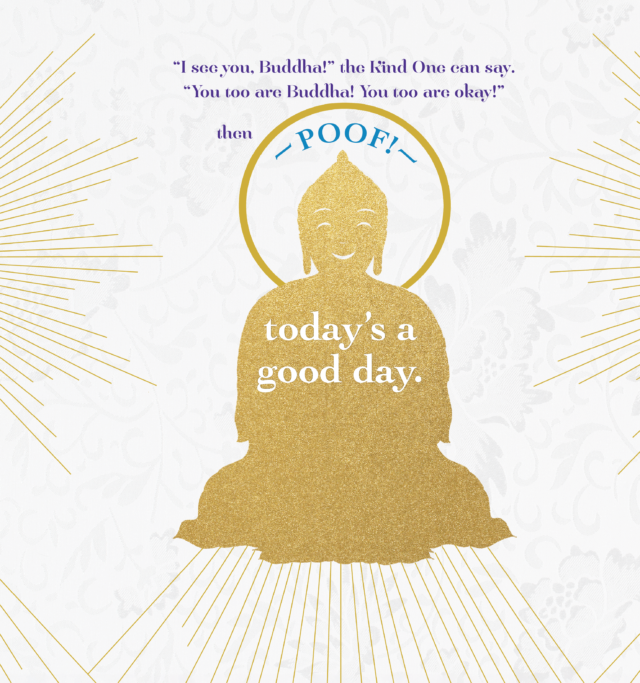
An instant classic, this book will help children (and their parents) learn patience and to see the good in everyone—including themselves! It will also help children meet difficult circumstances, such as being sick, doing chores, and not getting everything they want—and help them overcome low self-esteem and negative self-talk.
I See You, Buddha is based on a chapter in the Lotus Sutra, one of the most influential Buddhist texts worldwide—a classical scripture that has inspired a whole genre of works, especially in Japan, known as Lotus Literature. The Lotus Sutra teaches the way of the bodhisattva—a being engaged in compassionate, enlightened activity in the service of all—by offering examples of what this activity might look like in the world. One such model in the text is Bodhisattva Never Disrespectful (or Never Disparaging), who, despite troubling encounters with and even harsh treatment from others, bows down respectfully to everyone, recognizing their Buddha nature and honoring their own journeys along the bodhisattva path to enlightenment—whether they know they’re future buddhas or not!
Listen to author Josh Bartok as he reads I See You, Buddha in this video reading.
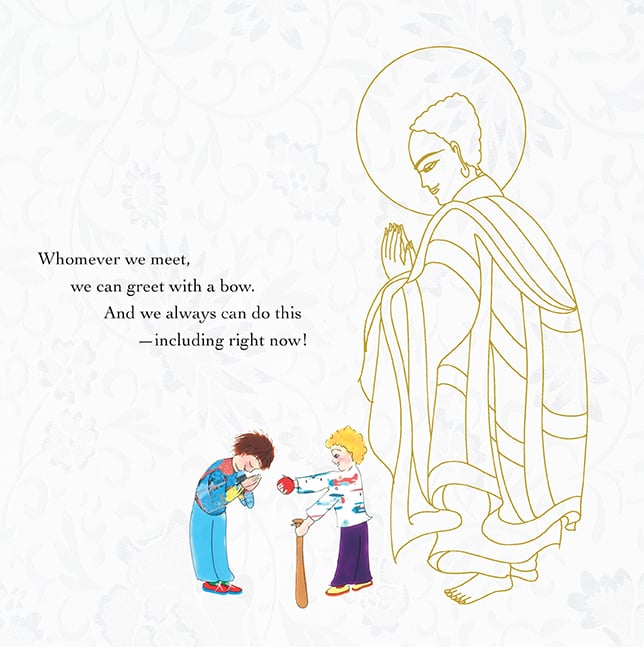
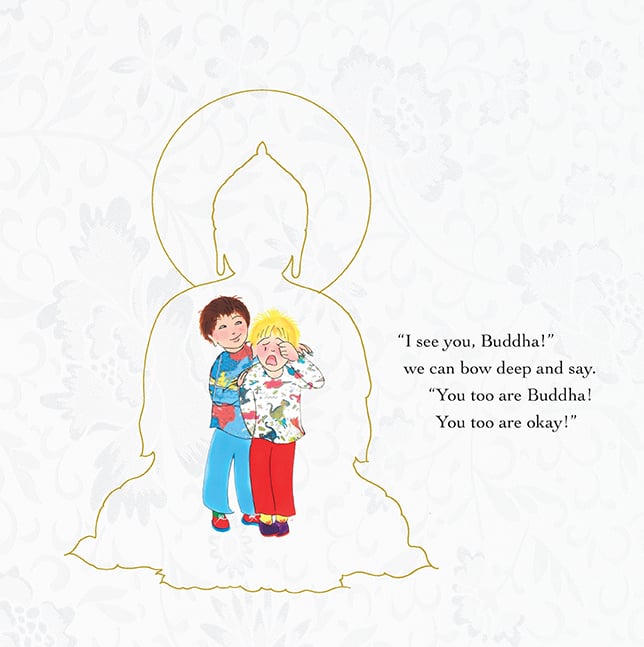
Grieving Is Loving
A book of poems, quotations, reflections, and stories from the author of one of the most beloved books on grief and loss.
This book is a companion to carry with you throughout your day, to touch in with and be supported by when bearing the unbearable pain of a loved one’s death—whether weeks or years since their passing.
In the style of a quote-a-day collection, this book from Wisdom’s bestselling author Joanne Cacciatore distills down the award-winning book Bearing the Unbearable into easy-to-access small chunks, and includes much brand-new material, including new prose and poems from Dr. Jo and other sources.
If you love, you will grieve—and nothing is more mysteriously central to becoming fully human.
Our culture often makes the bereaved feel alone, isolated, broken, and like they should just “get over it”—this book offers a loving antidote.
Open to any page of Grieving Is Loving and you’ll find something that will instantly help you feel not alone, while honoring the full weight of loss.
This book is comprised of quotations from Bearing the Unbearable, and other sources as well, plus an enormous amount of new material from Dr. Jo. Especially well-suited for the grieving mind that may struggle with concentration, just 30 seconds on any page will empower, hearten, and validate any bereaved person—helping give strength and courage to bear life’s most painful losses.
You can also explore Dr. Jo’s book, Bearing the Unbearable, its journal companion, Bearing the Unbearable: A Guided Journal for Grieving, as well her her Wisdom Academy course, Bearing the Unbearable, and her card deck, Cards for Bearing the Unbearable.
The Grand Delusion
In The Grand Delusion, bestselling author Steve Hagen drills deeply into the most basic assumptions, strengths, and limitations of religion and belief, philosophy and inquiry, science and technology. In doing so, he shines new light on the great existential questions—Why is there Something rather than Nothing? What does it mean to exist? What is consciousness? What is the nature of truth?—and does so from an entirely unexpected direction.
Ultimately, this book reveals how all of our fundamental questions stem from a single error, a single unwarranted belief—a single Grand Delusion.

